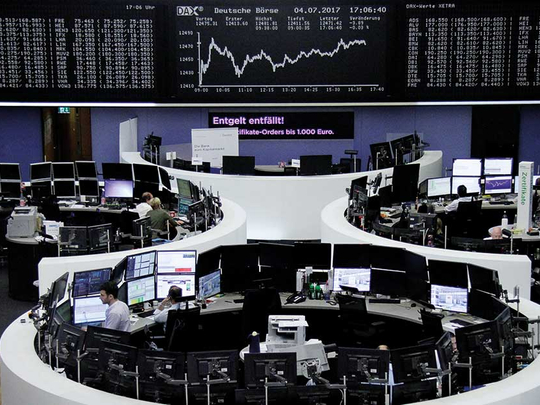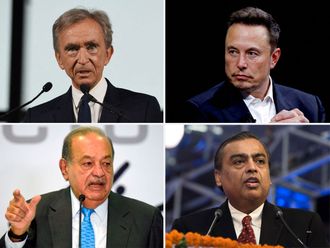
LONDON
Oil recovered from a heavy fall on Thursday but European stocks and the biggest emerging market currencies tumbled for a second day, as investors retreated in the face of rising global borrowing costs.
German Bund yields hit their highest in 1-1/2 years as a sell-off in European stocks and bonds snowballed. Wall Street was set to fall for the first time in four days, while the dollar started to backslide again.
With the Federal Reserve sending mixed signals on its balance sheet plans, investors were focusing on US jobs data due on Friday. A summit of G20 nations has also taken on greater significance following this week’s test of a long-range missile by North Korea.
Fund manager Jan Dehn of Ashmore identified a trio of concerns spooking investors, especially in emerging markets.
“One is the Middle East and the Qatar-Saudi situation and even the oil market doesn’t know how to handle that one,” he said. “The second is North Korea, which is classic geopolitical risk, and finally, and probably most importantly, there has been the recent hawkish tilt from the major central banks and it seems to be coordinated.” Dean also cited some profit-taking in emerging market assets after a stellar first half to the year.
South Africa’s rand, Turkey’s lira and the Russian rouble all fell sharply on Thursday for a second consecutive day.
The rand fell 0.7 per cent, extending Wednesday’s 1.6 per cent drop driven by ANC proposals to nationalise the respected central bank and expropriate land without compensation, and by the ruling party’s failure to agree much-needed reforms.
Bond yields, which drive global borrowing costs, pushed higher again ahead of US trading with benchmark US Treasury yields testing 2.4 per cent as they rose for a sixth day in the last seven.
Bunds led European yields higher too, with comments from the ECB’s chief economist stressing ahead of the bank’s latest meeting minutes that it needed to keep a “steady-hand policy” doing little to change the sentiment.
The minutes themselves then showed policymakers had last month discussed dropping their pledge to expand or extend the bank’s bond-purchase programme if necessary.
“If confidence in the inflation outlook improved further, the case of retaining this (easing) bias could be reviewed,” the ECB said in the accounts of its June meeting.
Destabilising activities
Commodity markets continued to swing wildly.
Brent oil was at $48.54 a barrel ahead of US trading as it recovered 1.5 per cent of a 4 per cent drop seen on Wednesday when rising Opec exports raised fresh questions about the group’s plans to cut global supply.
Gold was down near an eight-week low at $1,222, though industrial metal aluminium hit its highest in more than five weeks as worries about Chinese supply were fanned by market talk that local smelters would be forced to shut capacity.
Ahead of the formal start of the G20 meeting in Germany there was plenty of talk from the major players.
Host Angela Merkel said the summit should strengthen international cooperation but a top Chinese official warned the United States that rising tensions over North Korea should not be used as an excuse to impose sanctions on his country.
In a speech in Poland, US President Donald Trump meanwhile urged Russia to “cease its destabilising activities” and urged it to join the wider international community to tackle problems.
US stock futures pointed to a 0.3-0.4 per cent dip for Wall Street’s S&P 500 and Dow Jones indexes while the dollar was stalled at 113.32 Japanese yen and $1.1383 per euro.
Traders were wary though of making sudden moves, with a flurry of US data looming or already arrived, including ADP employment, ISM non-manufacturing PMI and the initial jobless claims report, all of which are appetisers ahead of Friday’s Payrolls numbers.
European stocks were pushed to their lowest in over two months by the day’s sell-off while the pound slipped back below 88 pence to the euro as Brexit tensions re-emerged in Brussels.
The European Union’s chief negotiator Michel Barnier warned British ministers and businesses who are calling for “frictionless trade” post-Brexit that is “not possible”.
Barnier also said he was ready to handle a failure of talks and “no deal” but that would be damaging, especially to Britain, and he saw “no reasonable justification” for it.
Overnight in Asia, MSCI’s broadest index of Asia-Pacific shares outside Japan ended down 0.1 per cent.
Japan’s Nikkei slipped 0.5 per cent as a stronger yen depressed the outlook for export earnings.
Trading in Asia has been buffeted this week by tensions on the Korean peninsula after North Korea fired a missile, which US officials concluded was an intercontinental ballistic missile, into Japanese waters.





_resources1_16a08546a2b_small.jpg)






